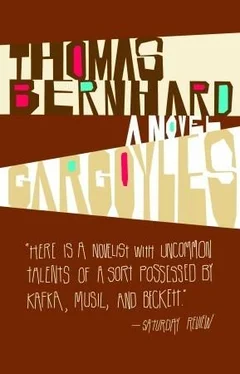In many Styrian houses, he went on, especially places steeped in darkness, as in that gorge, valuable works of art had been discovered and brought to light in the recent past. They were all gone by now. Gripped by a mania for antiques, city people had systematically robbed the whole country of its art treasures in recent years, and left behind a proletarian wasteland.
The gorge narrowed still more. First hemlock instead of pines stood along the river bank. There must be trout there, my father said. If we weren’t in such a hurry — because before seeing Prince Saurau he also wanted to look in on the Krainer children who lived in one of the low-roofed servants’ houses right below the castle — he would stop and look for trout in the river.
I was feeling horrified by the thought that there were people living in a place situated where that mill was. And what people! The dead birds had all exuded an alien odor of decay, I said. Some people, like those at the mill, I said, were forced to live their lives in the kind of cruel solitude that prevailed in the gorge. They had no choice; they were bound to their house, to their meager source of income, to a river like the one we were now following to its source. Others, I said, like the industrialist, of their own free will deliberately entered such solitude as he and his sister had at Hauenstein. But even as I said that, I thought that no one does anything of his own free will, that it is claptrap to say that men have free will. Suddenly the world seemed to me completely eerie; never before had I felt it to be so eerie as now, while we were still driving into the gorge. Soon we could hardly see anything, but my father had known the road for years. Where nature is purest and most untouched, as here in the gorge, it is at its eeriest.
Had my father noticed, I asked him, that the Turk gave the impression of being utterly terrified? They had put him into the dead uncle’s room, but he had fled it in the middle of the night and gone to the sons’ room, where he had lain alternately in the bed of the one and the other and begged them not to throw him out. They would let the Turk sleep in their beds for a few days, the younger son had said, until he stopped being afraid, until he grew used to the gorge. They couldn’t keep the Turk’s name in mind, I said, nor had I been able to, and so they simply called him Turk. All the miller’s sons knew about him was that he had seven brothers and sisters at home, and parents to whom he wrote, because why otherwise would he have bought so much letter paper in Knittelfeld before he left with the older of the two sons, who had hired him away from a construction company there? They had not been able to make him understand their reason for killing all the birds. They did not understand him because they did not know a word of Turkish; he did not understand them because he spoke hardly any German. The Turk had been terrified of both of them, the miller’s son had told me, when he saw them wringing the necks of the birds as they were taken out of the cage. He had leaned against the wall of the house absolutely motionless. Of course he might well have thought they were crazy . Because it hadn’t entered their minds how brutal that was, they had laid the first corpses right in front of the birdcage, where the other birds could see them, and these first they had killed simply by squeezing their throats, which caused blood to spurt out. But then one of them thought to wind the birds’ necks around the index finger and break the spine; and for that they went behind the cage. The bird swooned anyhow as soon as the neck was vigorously crooked around the finger the first time. You could hear the backbone breaking under the head. Again and again they had called on the Turk to help them finish off the birds just the way they were doing it; they told him to fetch some more birds out of the cage, but he would not. Then, apparently, the Turk had suddenly understood and all alone had killed ten or twelve birds by their method, much more skillfully than they. He had also brought empty flour sacks and covered the birds with them as they lay side by side on the board with their dangling heads.
I suddenly felt that the only way to escape the depression that matched the prevailing duskiness of the gorge was to begin to talk about Leoben. It seemed to me when I abruptly spoke of Leoben that I was speaking of the outside world. I forced myself to see myself alternately in the Mining Academy and in the dormitory. I concentrated on a precise vision of my dormitory room. Now I am seeing the dormitory room and it is not empty, I thought. Now I am seeing the dining room, and I am in the dining room. I see the municipal square of Leoben and I am in the municipal square of Leoben. I see the engineering professors and I am among them, although I am not among them but in the gorge. In reality I am in the gorge. But I am also in Leoben in reality. Everything is in reality , I thought.
“For a long time now,” I said, “I have felt not merely exposed to my studies, but more and more committed to them. And for a long time now I have stopped regarding them as fantastic.” It was no longer so hard for me to discipline myself as it was at the beginning, I said. During the whole of the first year I had been more or less a pitiable victim of the melancholia rife among all the students, a melancholia that poisoned everything for everyone, and as a result had been capable of only the most ridiculous, the tiniest, progress in my science. But now everything seemed easy and clear to me. “I have been able to fend off bad influences, to keep them away from my body and my brain,” I said. “I know what is useful.” But it had been a terrible process, I said, and I had been able to escape from the monotony of my own mental blindness only by the greatest ruthlessness toward myself. Youth is a dreadful condition, I thought. But it seemed to me foolish to say anything of the sort to my father. I had long been giving him a false picture. I saw no good purpose in telling him that there were still many things that oppressed me, that I was by no means free from problems. Or that my problems were also increasing with time. He may believe I had no problems at all, I thought. I go on deliberately giving him a false picture. Just at this moment I was not at all sure why. “I have always taken pleasure in resolving my problems myself,” I said. Had I said too much? My father was not even listening to me. Perhaps he was thinking only of the two Krainer children, or of Prince Saurau. I am strong enough now to resolve everything by myself, I thought. Often I am ashamed of feeling that I am stronger than others, though this feeling keeps recurring. But I did not speak of that.
The most striking thing about me is my incommunicativeness, which differs entirely from my sister’s incommunicativeness. My silence is the opposite of my sister’s. And my father’s silence, his incommunicativeness, is again entirely different. What I know of him is always too little for me to be able to put together a picture of him as he really is, I thought.
For a moment I thought: You intended to spend today with your sister.
Aloud, I said: “The unforeseen is what is beautiful.”
I still have tomorrow, I thought, with relief. Tomorrow, Sunday, I’ll get up early and take a very long walk with my sister. And talk with her. In Leoben, I thought, I spend the whole week in my room, shut up within myself in my room, more and more hermetically isolated from the outside world as the year draws to its end, I don’t even allow myself a breath of air any more! I offend many people by isolating myself that way. If once in a while I weaken and engage in a conversation because the others press me, I am always sorry. Is there any other way for me? I must go to bed before eleven, I think, and I rise at five. If I let myself deviate by even a hair’s breadth from my schedule, I lose my equilibrium. As a scientist the only way is to pass through the endless, dark, and most of the time almost entirely airless corridor of your science in order to reach life.
Читать дальше












